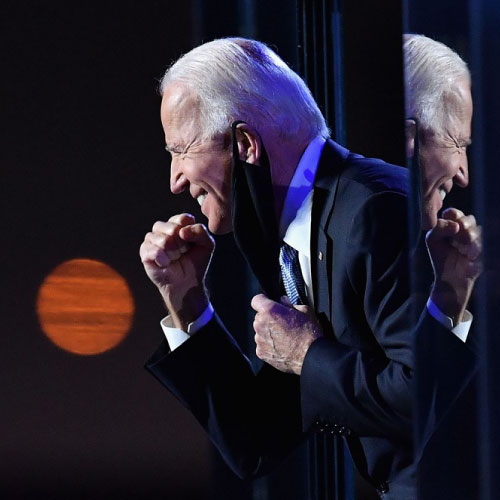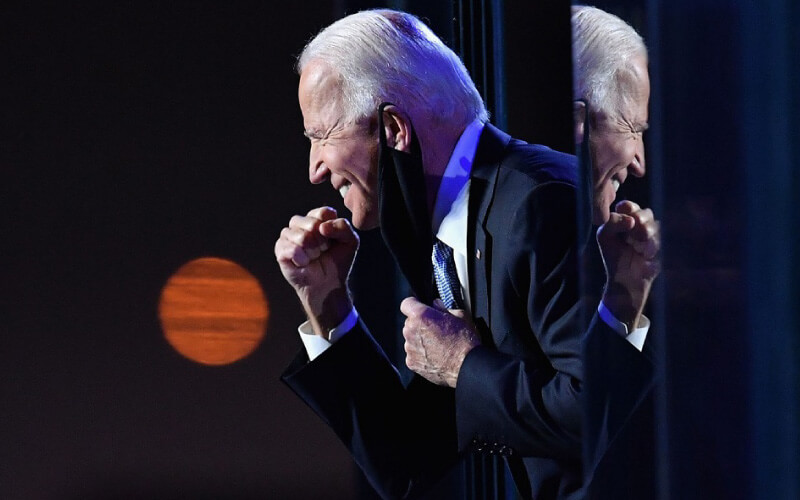After US presidential nominee Joe Biden announced his election victory, his speech focused on a wish to unify the country and to not treat opponents as enemies while the camp of incumbent President Donald Trump sought legal solutions.
Many in the United States may take Biden’s message to heart for the sake of their own country. But governments around the world — both the US and other countries — heed this message as well when conducting their foreign policy. For the US, such words about not treating your opponent as an enemy, ending an era of demonizing others and lowering the temperature will be critical in its foreign policy position toward China.
For the new administration domestic challenges will need to be priorities: getting a handle on the COVID-19 pandemic, stimulating the economy, and working to restore social harmony in the aftermath of the Black Lives Matter protests. This is a tall order for any leader in the beginning of a term.
But the world’s problems won’t wait for the US to get its house in order, and the US has an important role to play.
The best way for the United States to be a positive force in world affairs given how it is gripped by division at home is to find ways to partner with China, a new doctrine of engagement with the second most powerful country.
As we have seen fighting China is a meaningless exercise. Hawks and traditionalists on either side may view this as utopian, but it would be in the interest of the US to win it more friends especially in Asia who would like to see both the US and China work for the betterment of the region rather than be left to choose between two friends.
From climate change to controlling the pandemic, from nuclear non-proliferation to peacekeeping, a post-pandemic world more than ever needs countries that work together — even those that may compete in other areas of world affairs, and who may disagree on a number of key values.
Biden has already signalled a more cooperative relationship with the rest of the world. He’s already noted that the US will stay in the World Health Organization, and will re-join the Paris Climate Agreement on the first day of his term. In general, we can probably expect a more cohesive and conciliatory approach to the rest of the world, even towards countries that compete with the US.
Key to this is the relationship between China and the US. The Trump administration seemed hell-bent on creating tensions rather than working to solve difficulties between the two superpowers of the world.
But much as we say that the US must take a less aggressive stance in its differences with China, and that it cannot solve these major global problems without China, we should also say that China cannot solve these problems without the US.
China cannot take action on resolving these existential threats to the globe without partnering with the US. The role of the two countries in the world will depend on cooperation rather than conflict. Both stand to lose as will the world if they do not seek common world. They owe this to the world.
We could think of a few areas of cooperation. The obvious answer is climate change: as the world’s largest economies, both China and the US need to get a handle on their carbon emissions and resource consumption. Working together they will also be able to assist the countries which need financial and technological assistance especially in Asia and Africa.
Other areas are the Korea Peninsular and the Middle East: areas where tensions need to be closely managed to ensure they don’t spiral out of control. Then there are areas where Beijing and Washington’s interests compete, but where discussion can at least determine some “rules of the road”: disputes over the South China Sea, or discussions over technological progress, for example.
There will be many things that the US and China will disagree on. There is still a great deal of mistrust of China in American politics, on both sides of the divide; it is likely that there is a great deal of mistrust of the US among Chinese society and vise versa. That is unlikely to go away any time soon. But there is a lot more to be gained by cooperation and this is the moment to write a new chapter.
The two sides should urgently start a productive conversation, understand where they need to work together, and communicate their views candidly on issues of contention. There is still enough goodwill and that would be a good start.


























